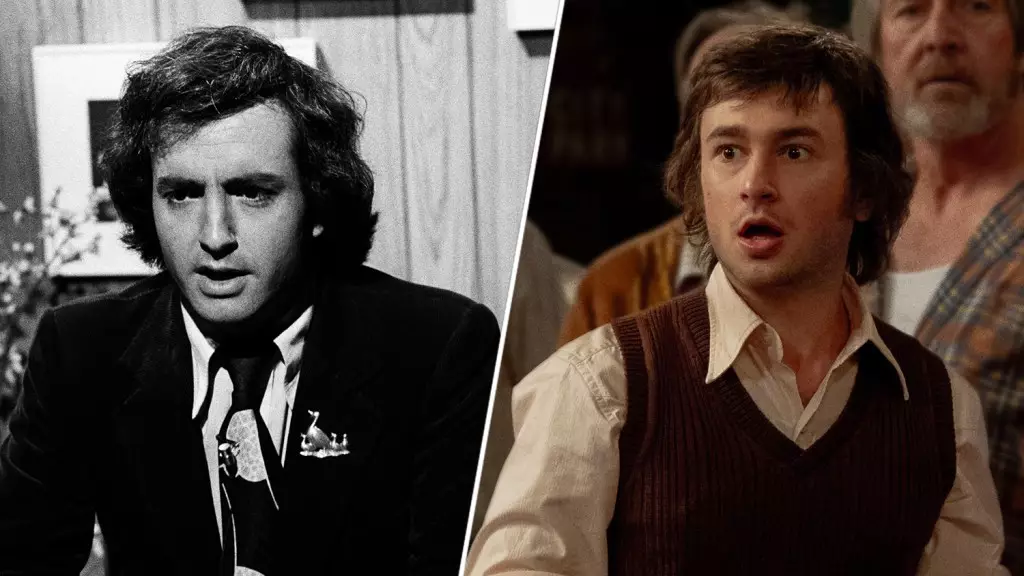The evolution of American television has been significantly shaped by groundbreaking shows that created new paradigms for entertainment. One such show is “Saturday Night Live,” a program that has not only entertained millions but also completely redefined the late-night landscape. Gabriel LaBelle, the actor portraying SNL creator Lorne Michaels in the forthcoming film “Saturday Night,” takes us behind the curtains of this iconic era, offering a unique perspective on the genesis of one of television’s most celebrated shows.
LaBelle’s portrayal of Michaels serves as a window into an important moment in television history. The film, which premieres on October 11, aims to encapsulate the energy, creativity, and sheer chaos surrounding the first-ever broadcast of “Saturday Night Live” on October 11, 1975. By focusing on the 90-minute lead-up to the inaugural episode, LaBelle and the filmmakers hope to bring audiences closer to the minds that transformed late-night TV.
His experience at 30 Rockefeller Plaza, where he experienced a live taping of SNL, can undoubtedly be categorized as a once-in-a-lifetime opportunity. The chance to meet Lorne Michaels himself and engage with the cast after the show demonstrates a commitment to authenticity. This intimate interaction not only humanizes the narrative but offers an insider’s account of how the show’s dynamics work, providing depth to the film’s storytelling.
Few actors get the chance to rub shoulders with those they’re tasked with emulating, but LaBelle was fortunate. His recollections of the event reveal not just the excitement surrounding the film but also the reverence with which he holds those who laid the groundwork for sketch comedy in America. Conversations were brief but poignant; meeting stars such as Scarlett Johansson emphasizes the interconnected nature of the entertainment industry. It highlights how the past and present collide, making the film resonate with nostalgia and contemporary relevance.
By allowing these experiences to influence his performance, LaBelle deepens the credibility of his role. It is clear that there is an appreciation not just for the character he is playing, but also for the social tapestry of creatives that defined an era. The film does not merely serve as a biopic; it aims to encapsulate a piece of cultural history.
While LaBelle is immersed in this environment, it remains unclear how Lorne Michaels himself might react to the portrayal. The uncertainty surrounding whether Michaels will ever see the film adds an intriguing layer to the narrative. Director Jason Reitman expressed that he has maintained contact with Michaels and described him as a “cryptic person.” This ambiguity evokes curiosity about how such a key figure in comedy may perceive a cinematic interpretation of his life and work.
LaBelle’s candidness regarding this uncertainty illustrates an important aspect of the creative process: the balance between artistic representation and the reception by those who lived through the real events. This complexity strengthens the narrative tension not only in the film but also in the real-life anticipation surrounding its release.
The film features an impressive cast that goes beyond just LaBelle and his portrayal of Lorne Michaels. With actors like Rachel Sennott, Dylan O’Brien, and Willem Dafoe stepping into the shoes of television legends like Gilda Radner and Chevy Chase, the project aims to create a rich tapestry of characters that contributed to the cultural phenomenon that is SNL. Each actor brings their unique flair, which promises to elevate the film from a simple recounting of events to an immersive experience that captures the essence of the SNL era.
In sum, “Saturday Night” is positioned not just as a biographical film, but as a celebration of creativity and the revolutionary spirit of a generation. LaBelle’s journey, fueled by the insights gained from his experiences and the illustrious personalities he encountered, forms the backbone of a project that seeks to honor the legacy of a show that fundamentally altered the landscape of television comedy. As the premiere date approaches, audiences are left eagerly anticipating how this poignant portrayal will resonate.

